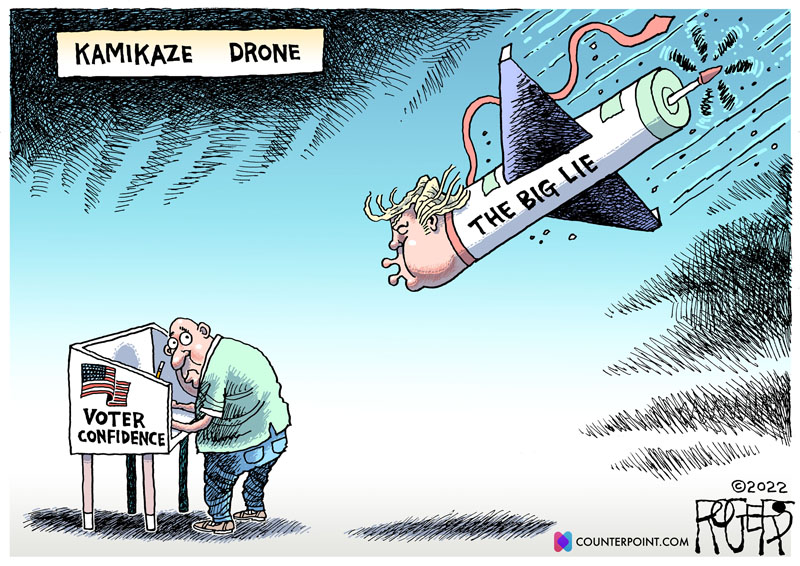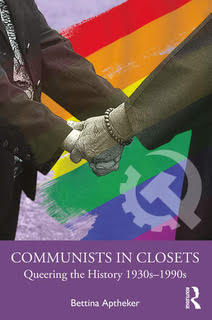Tidbits – Oct. 20, 2022 – Reader Comments, Elections – It’s the Economy and Abortions; Lessons of Cuban Missile Crisis; Socialist Lessons; Communists in Closets; Anti-Fascism in the 21st Century; the Farmer-Labor Movement; Cartoons; More…
Re: Democrats Shouldn’t Focus Only on Abortion in the Midterms. That’s a Mistake (David Mott; Reno Calleja)
Priorities -- cartoon by Mike Luckovich
Re: Vectors of Inflation (Peter Schneider)
Lying Drone -- cartoon by Rob Rogers
Re: Why the Narrative That Critical Race Theory ‘Makes White Kids Feel Guilty’ Is a Lie (Kris Sarabjit)
Re: We Never Learned the Key Lesson From the Cuban Missile Crisis (Judith Halprin; Charles)
Re: How the West’s Sanctions on Russia Boomeranged (Stan Nadel)
Re: Why More Places Are Abandoning Columbus Day in Favor of Indigenous Peoples Day (Arlene Halfon)
If Mom Hadn’t Gotten That Abortion I Wouldn’t Be Here -- cartoon by Barry Deutsch
Re: Some Lessons on Planning for the Twenty-First Century From the World’s First Socialist Economy (Daniel Ashworth)
Announcements:
Book Talk - Communists in Closets: Queering the History 1930s–1990s with Bettina Aptheker - November 2 (Tamiment Library)
Anti-Fascism in the 21st Century Conference - November 2 - 3 (Hofstra University)
History Revealed: The Farmer-Labor Movement: A Minnesota Story - November 10 (East Side Freedom Library)
Re: Democrats Shouldn’t Focus Only on Abortion in the Midterms. That’s a Mistake
My thoughts exactly.... while I think that women's health care and abortion right are very important.... Dems must be more aggressive on the economic crisis facing American workers....The abortion issue is important but it is not a decisive issue to everyone....putting all eggs in one basket is not a prescription for victory....
David Mott
Posted on Portside's Facebook page
=====
I am not American. Indeed I come from the small Island of Malta where education is free, medical care is free and where those sick and in need are protected and helped
I agree with senator Bernie Sanders whom I admire very much. People care most about the pocket
I have a lot of friends from the United States
They are all worried about The high cost of living and other economic problems faced by the needy
While abortion issue will attract many women who before the stupid constitutional court decisions would probably have not voted, the main issue is the cost of living an making ends meet
Reno Calleja
From Malta
Priorities -- cartoon by Mike Luckovich

Mike Luckovich
October 20, 2022
Atlanta Journal-Constitution
Really interesting. Thanks for s3ndin. I will forward it to my constituency.I still don’t fully grasp the in’s and out’s of financialization. Does the term refer to all those weird instruments like mortgage-backed securities in which case it means putting money into non-productive (materially non-productive) investments. Does it mean anything further?
Peter Schneider
Lying Drone -- cartoon by Rob Rogers

Rob Rogers
October 19, 2022
robrogers.com
Re: Why the Narrative That Critical Race Theory ‘Makes White Kids Feel Guilty’ Is a Lie
Our classrooms are not sites of demoralized children who hate themselves and their country. Students are hungry for explanations — real explanations — for the world they have inherited.
Kris Sarabjit
Posted on Portside's Facebook page
Re: We Never Learned the Key Lesson From the Cuban Missile Crisis
Amazing that left out of this account was the speech Kennedy made at the American University and the comparable remarks by Khrushchev, both men reflecting on the danger to the whole world the weapons created. Also missing is the later learned orders to three senior officers in Cuba that were if it seemed war was imminent all three had to agree to use the nukes they had there. One officer voted no, both men at the helm of their countries took us back from the brink. The real lesson is the brink. What if the next brink finds Putin and Trump At the helm?
Judith Halprin
Posted on Portside's Facebook page
=====
What should Biden do, just completely ignore Putin's invasion of Ukraine and let him "annex" more of that country, and possibly others in the surrounding region? Belarus is more or less just a puppet state of Putin, as he has stated in his own words, many times over, his ultimate goal is to reconstruct the soviet union, and even beyond.
Of course Biden responded with an "Armageddon" type of reference, as almost anyone else in that position might, given that Putin initially came out with the threat of nuclear weapons, not Biden or anyone in NATO. No one in their right mind wants to see a nuclear confrontation, but that's the point here, Putin is in his own delusional fantasy world, envisioning himself as a sort of Peter the Great of the 21st century.
My personal opinion is that if he really did start ordering nukes to be fired into Ukraine, it would be at that point a coup would likely take place, very likely from his own military, if not the FSB (which already has very differing views on this entire "special military operation"). Yes, there are some fanatical far right lunatic fringe generals who might actually carry out these orders, but there are also many who do not share these fanatical sentiments at all.
Even though many of the oligarchs and inner circle elites have "disappeared" under mysterious circumstances, or fell out of windows, committed suicide by shooting themselves in the back of their heads, and so on, those that are still remaining can't be seeing any sort of upside to any of this. Russia's economy is getting completely crushed, the military is in shambles, the best and brightest have already escaped Russia, meaning a brain drain from Russia's future, Putin himself has plunged Russia into a state of becoming a global pariah . . . what is the upside for these remaining insiders?
Just a bit of a side note here . . .Yes, it is true that US submarine commanders can launch strategic nukes independently (and so can Russian sub commanders), but it's not as you painted a picture, of a rogue commander suddenly deciding it's time to start launching nukes at Russia or wherever, it doesn't work that way. This operation is considered an extreme last resort, if all forms of communication have been lost, and requires the cooperation of other senior officers before anything can be prepped and launched.
Also, there are well established protocols for relieving a commander if he is showing signs of mental instability or other difficulties. Indeed, such is seen as a required duty to invoke the relieving of the commander under such conditions.
No one of any rational thought wants a nuclear war with anyone, but then again, we are dealing with an individual, Putin, who is becoming evermore irrational and desperate, if not unpredictable under such duress.
I'm just suggesting you might want to rethink some of the opinions you have woven into your article.
Charles
Sebastopol CA
Re: How the West’s Sanctions on Russia Boomeranged
Are we really supposed to believe that the Russian claims of increasing energy export income are accurate? Has nobody ever heard of war propaganda? And why does this report ignore all the other impacts of the sanctions which indicate a sharp drop in Russian GNP?
Stan Nadel
Re: Why More Places Are Abandoning Columbus Day in Favor of Indigenous Peoples Day
Next we need to acknowledge that the day we now call "Thanksgiving" should be renamed "Indigenous Massacre Day"
Arlene Halfon
If Mom Hadn’t Gotten That Abortion I Wouldn’t Be Here -- cartoon by Barry Deutsch
Barry Deustsch
October 16, 2022
Ampersand - Lefty Cartoons
Re: Some Lessons on Planning for the Twenty-First Century From the World’s First Socialist Economy
Worker as object or subject?
Political-economic development fosters specialization. Specialization necessitates attention to detail, discrete expertise and terminology, necessary to effectively navigate complex fields. This is also true for the field of political-economy itself.
Expertise for dealing with complexity is necessary. But professed motives aside, truly by and for whom are political-economic issues defined?
Bourgeois economics reduces profoundly human relationships into abstract formulas from an “on-high” managerial perspective. From these heights the worker’s role is revealed as object, to be employed towards ends from above - not unlike other commodities used in production. Ironically and in the name of “free market democracies," our working lives are so-commanded.
This very interesting piece centers employment of "cybernetics" at the heart of the Soviet Union's successes, and it's disregard at the heart of its collapse.
Cybernetics - at least as I understand it as a non-expert - is essentially guiding one's actions based on feedback from one's prior actions. Obviously, to successfully employ cybernetics, one has to be able to thoroughly and honestly evaluate "the feedback." This also begs the question: how does one's position in the political-economy define the "feedback" itself.
This core question of "who" seems determinative of cybernetic outcome - at least to this non-expert. Especially for those seeking to escape class-found culture, the preeminent question seems to be whose decisions generate, evaluate, and adjust to feedback. Is the political economy designed so that each worker in each workplace is afforded real democratic input to this process?
Significantly, this author describes creation by Stalin of a party "nomenklatura," (ruling class):
"Stalin’s elimination of the party maximum, which contributed to the collapse of Soviet society into social strata with huge differences in income; the enrichment of the appointed party nomenklatura; the flourishing of cynicism and careerism; and corruption in society. He therefore gave rise to those who would destroy him, and then the USSR as a planned economy."
While I don't take issue with Stalin sowing the seeds of counterrevolution, I think it is historically evident that he was exalted - not "destroyed" by this. (As an aside, I wonder to what extent socialists living in the land of the double-eagle, continue to need Stalin's "protection.")
This devastating acknowledgment of the recreation of a ruling class - albeit not in traditional capitalist garb - is not further explored. What does is say about the status of labor under Stalin, including during his professed successes? Can the domination of Capital be recreated absent it's traditional personifications, ie old-school capitalists? What is “socialist”? If mere elimination of capitalists does not end domination of Capital, with the worker as mere object, what is the affirmative answer to this "equation"? Cybernetics?
In fairness, the author states that it is "democracy" as well as cybernetics. But what "democracy" means is not further explored.
Instead, the author concludes:
"The moment has come to implement cybernetic economic planning that coordinates the activities of all industries and sectors toward a prosperous, sustainable future. Its implementation will mean a management revolution that will significantly increase the efficiency of state and global management. Just as the introduction of machines led to the first industrial revolution, thus affirming capitalism, so the introduction of the economic robot will generate a genuine second industrial revolution and establish socialism without the possibility of capitalist restoration."
We've seen managerial "revolutions" before, and while they've certainly increased "efficiency," they've further entrenched the objective domination of Capital - in whatever form - with the worker as passive object.
Daniel Ashworth

Wednesday, November 2, 2022, 5:00 PM – 6:00 PM EDT
Register here - Free
Join scholar activists Bettina Aptheker and Judith Smith as they discuss Aptheker's most recent book Communists in Closets: Queering the History 1930s–1990s.
About the Book
Communists in Closets: Queering the History 1930s–1990s explores the history of gay, lesbian, and non-heterosexual people in the Communist Party in the United States.
The Communist Party banned lesbian, gay, bisexual, and transgender (LGBT) people from membership beginning in 1938 when it cast them off as "degenerates." It persisted in this policy until 1991. During this 60-year ban, gays and lesbians who did join the Communist Party were deeply closeted within it, as well as in their public lives as both queer and Communist. By the late 1930s, the Communist Party had a membership approaching 100,000 and tens of thousands more people moved in its orbit through the Popular Front against fascism, anti-racist organizing, especially in the south, and its widely read cultural magazine, The New Masses. Based on a decade of archival research, correspondence, and interviews, Bettina Aptheker explores this history, also pulling from her own experience as a closeted lesbian in the Communist Party in the 1960s and ‘70s. Ironically, and in spite of this homophobia, individual Communists laid some of the political and theoretical foundations for lesbian and gay liberation and women’s liberation, and contributed significantly to peace, social justice, civil rights, and Black and Latinx liberation movements.
Bettina Aptheker is Distinguished Professor Emerita, Feminist Studies, University of California, Santa Cruz where she taught for more than 40 years, and had over 17,000 students in the course of her career. An activist-scholar she co-led the Free Speech Movement at UC Berkeley in 1964, and the National Student Mobilization Committee To End the War in Vietnam. She was a member of the Communist Party from 1962-1981. She has been part of the LGBT movement since the late 1970s, She has published several books including, The Morning Breaks: The Trial of Angela Davis, Tapestries of Life: Women’s Work, Women’s Consciousness and the Meaning of Daily Experience, and a memoir, Intimate Politics: How I Grew Up Red, Fought for Free Speech & Became A Feminist Rebel that was nominated for a Lambda Literary Award in 2006. She and her wife, Kate Miller, have been together since 1979. They live in Santa Cruz.
Judith Smith is Professor of American Studies Emerita at University of Massachusetts Boston, where she taught cultural history since 1945 and history of media and film. She is the author of Becoming Belafonte: Black Artist, Public Radical (2014) and Visions of Belonging: Family Stories, Popular Culture, and Postwar Democracy, 1940-1960 (2004). Her published essays explored how writers on the left addressed popular audiences on radio in the 1930s and 1940s, live television drama in the 1950s, and in film from the mid 1940s to the mid 1960s. She served as researcher/consultant for the recent documentary, Sighted Eyes/Feeling Heart: Lorraine Hansberry (2018).
Live closed captioning will be available.
Elmer Holmes Bobst Library
70 Washington Square South
Floor 2
New York, NY 10012
Anti-Fascism in the 21st Century Conference - November 2 - 3 (Hofstra University)
On October 28, 1922, armed fascists converged on Rome and paved the way for the establishment of a dictatorship led by Benito Mussolini, which would dominate Italy for the next 20 years. The March on Rome marked the birth of an Italian fascist regime and laid the foundation for the spread of fascist ideology around the world. From the beginning, Italian fascism generated resistance. As fascist ideology developed into a global phenomenon, so too did anti-fascism. The initial phase of the conflict between fascist and anti-fascist forces climaxed in World War II with the defeat of Italian fascism, German Nazism, and Japanese militarism. Although defeated militarily in 1945, global fascism continued to find expression during the decades that followed.
As recent events have shown, fascist ideology and its attendant components — opposition to working-class movements, hyper-nationalism, anti-democracy, white supremacy, and xenophobia — remain a threat to democratic institutions and practices worldwide. As in the past, the rise of fascism has been met with anti-fascist opposition. To coincide with the centennial of the March on Rome, we will hold a two-day interdisciplinary conference, not to retell stories of past anti-fascist movements, but to consider anti-fascism as a contemporary global movement with myriad forms and to explore the challenges of organizing against fascism for a new generation.
All sessions will be held in the Leo A. Guthart Cultural Center Theater,
Joan and Donald E. Axinn Library, First Floor, South Campus, unless otherwise noted.
WEDNESDAY, NOVEMBER 2, 2022
WELCOME/OPENING REMARKS
Mary Anne Trasciatti, Hofstra University
PANEL I: CONTEMPORARY EUROPEAN ANTIFA
PANEL II: ANTIFASCISM IN THE STREETS
KEYNOTE ADDRESS - How Serious is the Authoritarian Threat in the US, and What Can We Do about It? - Adolph Reed, Jr., Professor Emeritus of Political Science, University of Pennsylvania
PANEL III: BUILDING A GLOBAL ANTIFASCIST MOVEMENT
PANEL IV: TEACHING ANTIFASCISM
PANEL V: COMMUNICATING ANTIFASCISM: STRATEGIES, TACTICS, AND IMPLICATIONS
PANEL VI: CHALLENGING THE APPEAL OF FASCISM
KEYNOTE ADDRESS - “Fascism, antifascism and politics of memory in Italy in a global perspective” - Eric Gobetti, Independent Scholar, Turin, Italy
PANEL VII: ANTIFASCISM AS AN ANTICOLONIAL PROJECT
PANEL VIII: ANTIFASCIST CULTURE WARRIORS: CASE STUDIES OF MUSIC AND MEMORIALS
ROUNDTABLE: LOCAL ANTI-FASCIST ACTIVISM
Full Conference information here
November 10 @ 7:00 pm - 8:30 pm CST
The East Side Freedom Library, Ramsey County Historical Society, and Roseville Public Library invite you to a special session of History Revealed: The Farmer-Labor Movement: A Minnesota Story. This event will include a screening and discussion of a new documentary film.
Register here to join this event on Zoom.
The Farmer-Labor movement founded the most successful third-party in U.S. political history. This progressive movement elected candidates and advanced political change in Minnesota from 1917 until its merger with the Democrats in 1944, to form the DFL, the Democratic-Farmer-Labor Party.
The documentary portrays this history through the voices of Farmer-Labor leaders and their descendants, as well as contemporary historians and activists. Animated segments bring the personal stories of Farmer-Labor men and women to life, while songs from the period convey the spirit of the movement.
While the movement’s ideas and achievements still affect Minnesota’s political and social fabric, its history is largely unknown. The documentary addresses that awareness gap and points out how Farmer-Labor goals and the challenges still resonate today.
Please join filmmakers Randy Croce, Tom O’Connell, and Anna Kuharjec for a conversation after the screening.
Randy Croce has been a documentary photographer and video producer since 1976. His PBS broadcast shows include Clouded Land, If Stone Could Speak and Who built Our Capitol? He worked at the U of M Labor Education Service, where he produced shows with workers and their unions.
Tom O’Connell is a retired professor of Political Studies from Metropolitan State University and served as founding chairperson of ESFL’s Board of Directors. He has taught and written about social movements with a special focus on MInnesota’s Farmer-Labor and Progressive Populist History.
Anna Kuharjec has a Ph.D. in History from the University of Illinois and is teaching in the History program of the Dougherty Family College of the University of St. Thomas.
Free and open to all
1105 Greenbrier Street
St. Paul, MN 55106
651.207.4926


Spread the word